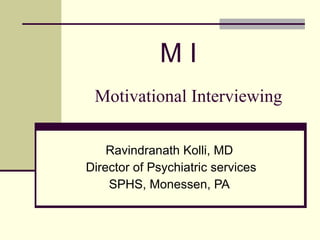
Motivational Interviewing by Ravi Kolli,MD
- 1. Motivational Interviewing Ravindranath Kolli, MD Director of Psychiatric services SPHS, Monessen, PA M I
- 2. Motivational Interviewing Motivational interviewing is a treatment intervention based on principles from humanistic psychology. Motivational Interviewing is “ a client-centered, goal-oriented method for enhancing intrinsic motivation to change by exploring and resolving ambivalence” Miller & Rollnick, 2002 Or… Helping people talk themselves into changing
- 9. Stages of Change Pre-contemplation: The person has no intention to change/ Not Ready for Change Contemplation: The person is ambivalent about change and sees both pros and cons to the behavior / Thinking About Change . Decision-making: This is typically a brief stage as the person resolves ambivalence and decides to make a change. Action: The person takes some action toward resolution of the problem behavior. Maintenance: For a year after the change has been successfully made, the client is at risk for relapse .
- 11. Stages of Change Model Processes of Change
- 16. LISTENING JUDGING HELPING UNDER - STANDING YES NO YES YES EMPATHY NO YES YES YES SYMPATHY NO YES NO YES ANTIPATHY NO NO NO NO APATHY
- 31. Opening Strategies (O A RS continued) An affirmation identifies something positive about the client and gives credit or acknowledgement. It may be a trait, behavior, feeling or past or present accomplishment. An example of an affirmation is, “I really like the way you are approaching this problem, I can see that you are very organized and logical and I am sure this will help you to succeed in our program.” An affirmation must always be genuine and never condescending. An affirmation can be used to reframe what may at first seem like a negative. “I can see that you are very angry about being here, but I’d like to tell you that I am impressed that you chose to come here anyway, and right on time!” Affirmations
- 47. Stages of Change Stage-Wise Interventions Engagement Building a relationship with the individual Reflective listening Meeting basic needs Persuasion Reflective listening Instilling hope Success stories Develop discrepancies Plans to change Active Interventions Education/information Relapse Prevention Strategies to prevent relapse Maintaining Supports Pre-contemplative Unaware there is a problem Lack of Insight Denial Contemplation Admitting/wanting to change but not able/willing to change Preparation Pros and cons list Unsuccessful efforts to change Action Motivated Taking steps to change Building supports Maintenance Met goal Prevention of falling back to old behaviors